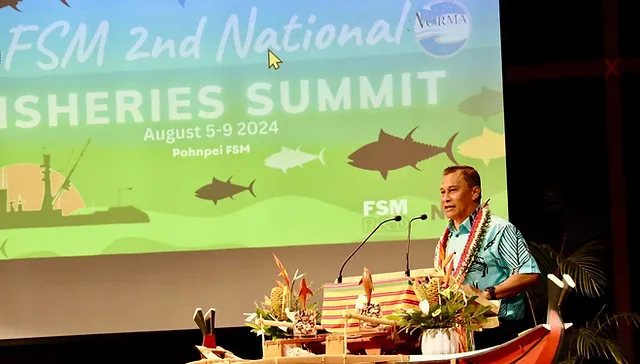The Federated States of Micronesia (FSM) is seeking to expand its tuna industry by securing broader access to the international market and reforming its foreign investment policies.
At the Second National Fisheries Summit earlier this month, Vice President Aren Palik said the nation must strengthen its partnerships with the European Union, and regional allies including Papua New Guinea and the Marshall Islands to access new markets and diversify revenues related to fisheries.
In his keynote address, Palik underscored the need for the FSM to streamline its foreign investment processes to create a conducive environment for the tuna industry “to grow and flourish.”
“We must not remain idle and watch others pass us by. Instead, let us seize new opportunities through collective partnerships both within and outside of the FSM,” he said.
The vice president highlighted the tuna fisheries’ crucial role in global food security, the FSM’s economy and its citizens’ livelihood.
“In 2021, the tuna fisheries contributed 16.6 percent of the FSM’s GDP, and in 2022, 19.17 percent,” Palik said, reiterating the FSM’s commitment to sustainable fisheries management.
Palik said the summit signifies “a collective commitment to the sustainable management and development of our nation’s most vital and renewable resource – our tuna.”
He emphasised the importance of protecting 30 percent of the ocean through the Blue Prosperity Micronesia program and the need to balance development with environmental sustainability.
“Let us reaffirm our strong commitment and determination to protect these valuable, yet finite, resources for long-term prosperity and the generations to come. Because to us – when it comes to prosperity – we believe that both the economy and our environment can and should thrive together,” Palik said.
He cited the FSM’s commitment to the East New Britain Initiative and the Pacific Island Tuna Program, which will expand the nation’s position in tuna fisheries development.
The FSM’s key stakeholders gathered at the Aug. 5 summit in Pohnpei to address the critical issues facing the fisheries sector and to strategise on sustainable management and development of the FSM’s fisheries resources.
Stakeholders also sought the endorsement of the National Oceanic Fisheries Investment Policy, aimed at enhancing onshore job creation, expanding skill sets, and forging new partnerships.














